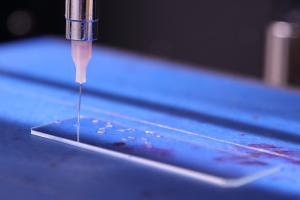Soft Materials
Our soft materials research program addresses challenges in sustainability and health.

Soft materials can be easily deformed by external stresses, electric or magnetic fields or thermal fluctuations. Examples include liquids, polymers, foams, gels, colloids, granular materials, liquid crystals and most soft biological materials. We study the behavior of soft materials under small and large deformations, create active soft materials that can better interface with biological systems, and use advanced manufacturing technologies to transform soft materials to functional structures and devices.
Research Groups
Liheng Cai Research Group
Our research aims to understand and control the interactions between adaptive soft materials, like responsive polymers or biological gels, and living systems, like bacteria or cells and tissues in the human body, to solve challenges in sustainability and health.
David Green Research Group
Our mission is to uncover how complex materials form and interact on the nanoscale. Hence, we synthesize and characterize novel materials with building blocks consisting of oligomers, polymers, and nanoparticles. We devote special attention to the understanding of nanoparticles with supramolecular interfaces that present nanoscale domains for molecular recognition.

